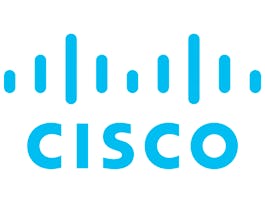This course will provide a solid foundation for understanding how APIs are utilized in network automation by discussing important topics such as data encoding formats, REST APIs, and the Python Requests library. Upon completion of the course, you will be equipped with the necessary skills to utilize APIs in your network automation solution and be able to describe the usefulness of APIs in this context.



Using APIs for Network Automation
Dieser Kurs ist Teil von Spezialisierung Network Automation Engineering Fundamentals

Dozent: Cisco Learning & Certifications
2.375 bereits angemeldet
Bei  enthalten
enthalten
(26 Bewertungen)
Empfohlene Erfahrung
Kompetenzen, die Sie erwerben
- Kategorie: Json
- Kategorie: Xml
- Kategorie: Application Programming Interfaces (API)
- Kategorie: Yet Another Markup Language (YAML)
- Kategorie: Representational State Transfer (REST)
Wichtige Details

Zu Ihrem LinkedIn-Profil hinzufügen
16 Aufgaben
Erfahren Sie, wie Mitarbeiter führender Unternehmen gefragte Kompetenzen erwerben.

Erweitern Sie Ihre Fachkenntnisse
- Lernen Sie neue Konzepte von Branchenexperten
- Gewinnen Sie ein Grundverständnis bestimmter Themen oder Tools
- Erwerben Sie berufsrelevante Kompetenzen durch praktische Projekte
- Erwerben Sie ein Berufszertifikat zur Vorlage


Erwerben Sie ein Karrierezertifikat.
Fügen Sie diese Qualifikation zur Ihrem LinkedIn-Profil oder Ihrem Lebenslauf hinzu.
Teilen Sie es in den sozialen Medien und in Ihrer Leistungsbeurteilung.

In diesem Kurs gibt es 4 Module
In this module, we will review the topics and what you will learn in this course.
Das ist alles enthalten
1 Video2 Lektüren1 Diskussionsthema
The foundational programming topic of data encoding formats is an essential skill for understanding the more advanced concepts like APIs (Application Programming Interfaces) and Python programmability. In this course, you will first learn about the two main data encoding formats, XML (extensible markup language) and JSON (JavaScript Object Notation), which are commonly used in APIs. This course also introduces YAML, a structured data format and markup language commonly used for configuration files in automation and is gaining popularity due to its ease of readability for humans.
Das ist alles enthalten
6 Videos7 Lektüren6 Aufgaben
The application programming interface (API) enables unrelated applications to interface with each other without having to understand how each other works or share the same programmatic language. APIs are becoming more commonplace in today’s digital age and are enabling a world of automation and interactivity. Network Engineers need to understand how to leverage APIs as vendors like Cisco are designing APIs for many of their products, enabling the ease of Network Automation and creating more possibilities to interact with 3rd party non-networking products.
Das ist alles enthalten
7 Videos6 Lektüren7 Aufgaben
Nearly any platform or commercial product comes with some sort of application programming interface (API) capability, many of which are HTTP APIs. These APIs can be used for machine-to-machine communication for network automation and can be the catalyst that you need to fully accelerate your network automation journey. You have seen how you can use Postman for testing and exploring HTTP APIs, but to do anything with the API, while in a programming language like Python, you need to use an HTTP client. One such client, which is presented in this section, is the Requests module for Python.
Das ist alles enthalten
4 Videos4 Lektüren3 Aufgaben
Dozent

Empfohlen, wenn Sie sich für Networking interessieren

Cisco Learning and Certifications

Cisco Learning and Certifications

Cisco Learning and Certifications

University of California, Davis
Warum entscheiden sich Menschen für Coursera für ihre Karriere?





Neue Karrieremöglichkeiten mit Coursera Plus
Unbegrenzter Zugang zu 10,000+ Weltklasse-Kursen, praktischen Projekten und berufsqualifizierenden Zertifikatsprogrammen - alles in Ihrem Abonnement enthalten
Bringen Sie Ihre Karriere mit einem Online-Abschluss voran.
Erwerben Sie einen Abschluss von erstklassigen Universitäten – 100 % online
Schließen Sie sich mehr als 3.400 Unternehmen in aller Welt an, die sich für Coursera for Business entschieden haben.
Schulen Sie Ihre Mitarbeiter*innen, um sich in der digitalen Wirtschaft zu behaupten.
Häufig gestellte Fragen
Access to lectures and assignments depends on your type of enrollment. If you take a course in audit mode, you will be able to see most course materials for free. To access graded assignments and to earn a Certificate, you will need to purchase the Certificate experience, during or after your audit. If you don't see the audit option:
The course may not offer an audit option. You can try a Free Trial instead, or apply for Financial Aid.
The course may offer 'Full Course, No Certificate' instead. This option lets you see all course materials, submit required assessments, and get a final grade. This also means that you will not be able to purchase a Certificate experience.
When you enroll in the course, you get access to all of the courses in the Specialization, and you earn a certificate when you complete the work. Your electronic Certificate will be added to your Accomplishments page - from there, you can print your Certificate or add it to your LinkedIn profile. If you only want to read and view the course content, you can audit the course for free.
If you subscribed, you get a 7-day free trial during which you can cancel at no penalty. After that, we don’t give refunds, but you can cancel your subscription at any time. See our full refund policy.

